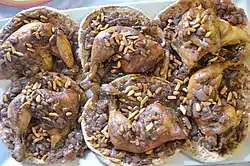Musakhan
Musakhan (Arabic: مسخّن) is a Palestinian Arab cuisine dish, composed of roasted chicken baked with onions, sumac, allspice, saffron, and fried pine nuts served over taboon bread. It is also known as muhammar (Arabic: محمر). It is often considered the national dish of Palestine. It also remains a very popular dish within the Arab triangle, areas near Iksal and Sandala villages, and Israeli Druze and Israeli Arabs in North Israel.[1][2] It originated in the Tulkarm and Jenin area.[3]
 | |
| Course | Meal |
|---|---|
| Place of origin | Palestine |
| Region or state | Levant |
| Main ingredients | Chicken, sumac, onion, taboon bread, olive oil |
The dish is simple to make and the ingredients needed are easily obtainable, which may account for the dish's popularity. Many of the ingredients used—olive oil, sumac and pine nuts—are frequently found in Palestinian cuisine. The dish is also popular in the Levant (Palestine, Israel, Syria, Lebanon & Jordan), particularly among Palestinians, Israeli Arabs and Jordanians.[4]
Musakhan is a dish that one typically eats with one's hands. It is usually presented with the chicken on top of the bread, and could be served with soup. The term "musakhan" literally means "something that is heated."[5]
Nutritional information
A typical recipe of musakhan has the following nutrition facts per serving (around 300 g):[6]
- Calories: 391
- Total fat (g): 33
- Saturated fat (g): 7
- Cholesterol (mg): 92
- Carbohydrates (g): 0
- Protein (g): 23
World records
On April 20, 2010, the largest ever dish of Musakhan was prepared in Ramallah, Palestine and entered it into the Guinness Book of World Records.[7] Palestinian Prime Minister, Salam Fayad, described it as a great achievement and honor for the Palestinian people: "This great achievement completely depended on Palestinian products, mainly olive oil. It also has a cultural dimension and a Palestinian message to the world that they want their legitimate rights."[8] The total diameter of the 'Musakhan' loaf was 4 meters, with a total weight of 1,350 kg. Forty Palestinian cooks made use of 250 kg of flour, 170 kg of olive oil, 500 kg of onions and 70 kg of almond.
References
- Trevor Mostyn (1983). Jordan: A Meed Practical Guide. Middle East Economic Digest Limited. ISBN 978-0-9505211-8-3.
- Haaretz (10 November 2014). "After Death Threats, Palestinian Food-serving U.S. Restaurant Closes". Archived from the original on 1 December 2017. Retrieved 24 April 2018 – via Haaretz.
- Albala, Ken. Food Cultures of the World Encyclopedia [4 volumes]: [Four Volumes]. p. 293.
- Ghillie Basan (January 2007). The Middle Eastern Kitchen. Hippocrene Books. pp. 189–. ISBN 978-0-7818-1190-3.
- "Recipe: Musakhkhan (Arab Levant, Palestine) Musakhkhan". www.cliffordawright.com. Archived from the original on 12 June 2017. Retrieved 24 April 2018.
- "كوكباد - Cookpad موقع الطبخ الأول في العالم العربي للطبخات والوصفات اللذيذة". كوكباد. Archived from the original on 4 March 2016. Retrieved 24 April 2018.
- "Archived copy". Archived from the original on 2017-10-12. Retrieved 2017-11-29.CS1 maint: archived copy as title (link), Palestinian 'Musakhan' enters Guinness records Archived 2010-04-23 at the Wayback Machine
- Baheth Center for Strategic & Palestinian Studies - English Website Archived 2011-07-23 at the Wayback Machine